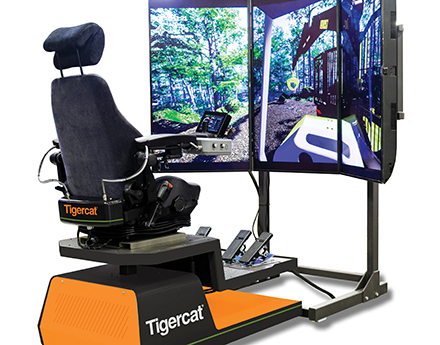As the Tigercat cut-to-length division continues to introduce new products and innovations, the need for more advanced training solutions has grown. In March 2021, Tigercat partnered with CM Labs Simulations to develop a series of simulators that will replicate the functionality and behaviour of its wheel harvesters. The wheel harvester simulator is the first to be completed. Source: Timberbiz
There are many benefits in using a simulator, not only for training but also for employers to screen potential employees. Companies are able to gauge how an operator will perform and use that information when assigning tasks.
Operators can be trained on a simulator without the fear of damaging equipment, so experimenting with different techniques or trying new methods can be done safely and risk-free.
Also, by training on a simulator, other equipment is not being tied up and slowing production. When operators have hands-on training using the simulator, it allows them to transition to actual machines at higher initial productivity levels, thereby lowering start-up costs.
Tigercat simulators have three screens, a motions platform, as well as all the associated Tigercat machine control software and hardware. The simulator’s software communicates directly with the Tigercat machine control software, so the controls are identical to the actual machine.
Any adjustments that can be made on the machine, can also be made on the simulator which helps teach operators not only motor skills but the effects of the many machine adjustments available to operators.
Tigercat simulators are equipped with an actual operator’s seat, including all control pods, the machine’s computer control system, as well as the harvesting head control system on the harvester simulator. The transition for new operators from virtual to actual is almost seamless.
“The introduction of the Tigercat simulator provides dealers with a valuable training tool that can save machine owners significant start-up costs. Using the simulator to teach operational skills in realistic environments allows the new operator to enter into a real machine with much higher productivity levels from the start,” Jon Cooper Tigercat VP, cut-to-length systems, said.
“This can produce extra production income and avoid expensive machine damage.”






